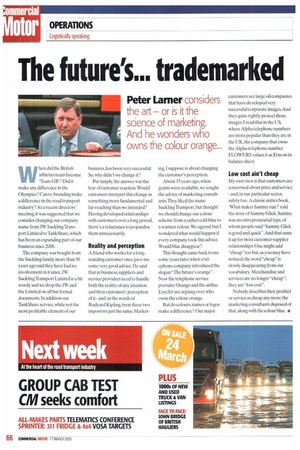The future's... trademarked
Page 68

If you've noticed an error in this article please click here to report it so we can fix it.
Peter Lamer considers the art—or is it the science of marketing.
And he wonders who owns the colour orange...
When did the British athletics team become 'Team GB'? Did it make any difference in the Olympics? Can re-branding make a difference in the road transport industry? At a recent directors' meeting, it was suggested that we consider changing our company name from JW Suckling Transport Limited to TankShare, which has been an expanding part of our business since 2000.
The company was bought from the Suckling family more than 30 years ago and they have had no involvement in it since. SW Suck lingTransport Limited is a bit wordy and we drop the SW and the Limited on all but formal documents. In addition our TankShare service, while not the most profitable element of our business, has been very successful. So, why didn't we change it?
Put simply, the answer was the fear of customer reaction.Would customers interpret this change as something more fundamental and far-reaching than we intended? Having developed relationships with customers over a long period, there's a reluctance to jeopardise them unnecessarily.
Reality and perception
A friend who works for a longstanding customer once gave me some very good advice. He said that in business, suppliers and service providers need to handle both the reality of any situation and their customers' perception of it and, in the words of Rudyard Kipling, treat these two impostors just the same. Market ing, I suppose, is about changing the customer's perception.
About 15 years ago, when grants were available, we sought the advice of marketing consultants. They liked the name SucklingTransport, but thought we should change our colour scheme from a rather cold blue to a warmer colour. We agreed, but I wondered what would happen if every company took this advice. Would blue disappear?
This thought came back to me some years later when a telephone company introduced the slogan "The future's orange". Now the telephone service provider Orange and the airline EasyJet are arguing over who owns the colour orange.
But do colours, names or logos make a difference? Our major customers are large oil companies that have developed very successful corporate images.And they quite rightly protect those images. Tread that in the US, where Alpha telephone numbers are more popular than they are in the UK,the company that owns the Alpha telephone number FLOWERS values it as $1rn on its balance sheet.
Low cost ain't cheap
My own view is that customers are concerned about price and service and, in our particular sector, safety too. A classic sixties book. 'What makes Sammy run?' told the story of Sammy Glick. Sammy was an entrepreneurial type, of whom people said "Sammy Glick is good and quick".And that sums it up for most customer-supplier relationships. One might add "cheap" too but, as you may have noticed, the word "cheap" is slowly disappearing from our vocabulary Merchandise and services are no longer -cheap"; they are "low cost".
Nobody describes their product or service as cheap any more; the marketing consultants disposed of that, along with the colour blue. •










































































































































































































